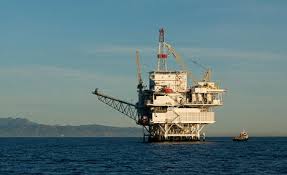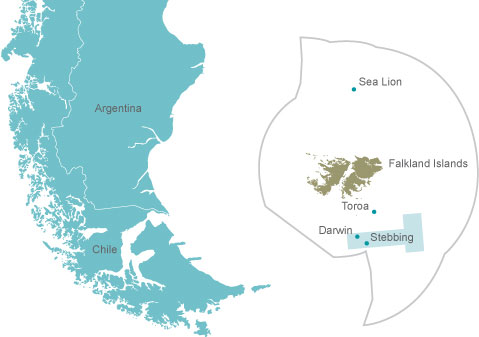Borders and Southern disappoints investors as farm out proves elusive
May 14, 2014 at 2:44 pm in AIM by contrarianuk
South Falkland basin oil and gas explorer, Borders and Southern (BOR), issued its preliminary results for 2013 today and unfortunately it didn’t contain the news that investors were hoping for. The shares are currently down 15% to 11p after a farm out deal for its acreage has appeared to slip from the company’s grasp at the last minute following the Darwin gas condensate discovery made in April 2012 .The recoverable resource is estimated to be 130 to 250 million barrels, with a mid case of about 200 million barrels.
Borders & Southern holds a 100% equity interest and operatorship of three Production Licences covering an area of nearly 10,000 square kilometres in the South Falkland Basin. The acreage is located approximately 150 km south-east of the Islands. In November 2012 the Company relinquished 50% of its acreage and entered the second exploration term under its licences, committing to drill one exploration well.
Reading the Chairman’s statement today it is clear that BOR have been hit by a double whammy of investment pressures within larger oil companies and the political risks associated with working in the Falklands because of the Argentinian government threats. The latter hampered fellow Falkland explorer Rockhopper Exploration which eventually farmed out its Sea Lion discovery in the North Falkland basin to Premier Oil on terms which severely frustrated Rockhopper shareholders and has accompanied a decline in the share price from around £4 to below £1.
The problem for Borders remains funding after it burnt most of its resources drilling in 2012 with mixed results and because of the depth of the South Falkland basin, the cost per drill compared to the Northern basin is high. At the end of 2013 the company had $23.2 million of cash and these are sufficient to cover forward overhead costs and all necessary short-term technical studies. However, in order to finance the next drilling campaign, partners will be necessary. Until the company finds a farm in, it is unable to take part in the next Falklands drilling campaign due to start in early 2015 once a rig has been secured by Rockhopper/Premier, Falkland Oil and Gas with partners Edison & Noble.
Although BOR has found a sizeable gas condensate discovery the technical challenges of extracting the find and building suitable local infrastructure to process and transport the product are not insignificant compared with crude oil. But even getting oil out of the Falklands has been a lengthy process for Rockhopper after an extended Front End Engineering and Design (FEED) stage which eventually chose a Tension Leg Platform as the preferred route and with the Final Investment Decision (FID) still potentially in the balance after senior management changes at Premier oil and institutional pressure, predominantly by Schroders, to drop the Falkland Islands project.
It would be interesting to know who pulled out of the Borders & Southern farm out deal and the nature of the external factors. Could it have been Cairn Energy perhaps which was hit by the unexpected Indian tax demand for its Cairn India stake late last year?
The Chairman’s statement read:
2013 was a very active year for the Company as we drove forward the technical evaluation of our Darwin gas condensate discovery and initiated a programme to bring partners into our Licences to help fund the next phase of appraisal and exploration drilling. Whilst we have been really encouraged by the on-going technical assessment of Darwin, which has confirmed the quality of the discovery, we are frustrated that the farm-out process is taking longer than originally anticipated.
We believe that this is a reflection of the current commercial environment in the international E&P sector. Whilst the oil price has remained relatively stable, the industry has lacked positive news stories. Exploration success has been limited, mid-sized companies (and the majors) are in restructuring mode and onshore US shale plays have attracted a significant proportion of the available capital. In the UK, the AIM Oil & Gas index – a good proxy for international early stage E&P – fell for the third year in a rowin 2013, along with many fully listed independents. Our challenge has been to attract the significant capital resources we need to a remote area outside of current industry hot spots such as Africa.
That said, we have had a good response to the farm-out and have been extremely encouraged by other companies’ views on the sub-surface data, endorsing our own interpretations. Darwin appears to be a relatively simple discovery with good quality reservoir. We have been very close to completing a farm-out, having negotiated commercial terms, only for the transaction to break down at the last minute due to external factors unrelated to the project. Needless to say, we will only close a farm-out transaction on terms we believe will deliver full value to all of our shareholders.
In the last quarter of 2013, in anticipation of closing out a farm-out, we initiated a rig search for a harsh environment, deep water rig for the next drilling campaign. When our farm-out negotiations broke down we passed over the lead for the rig contract negotiations to our Falkland Islands rig consortium partners. Even though we will not have secured a partner prior to the signature of the rig contract, we will be able to join the consortium at a later stage. We remain confident that a suitable partner will be secured and that we will participate in a 2015 drilling programme to appraise Darwin.
From an operations point of view we safely acquired additional 3D seismic data in 2013. The objective of the survey was to track the Darwin reservoir over nearby prospects that had previously been mapped on 2D data. The fast track data has been received and interpreted and early signs are that amplitude anomalies, that represent hydrocarbons on the Darwin structure, can be seen on other prospects. At this stage we are careful not to reach conclusions too soon and have just commenced assessing prospects and their associated risks using the final processed 2013 data and newly reprocessed 2008 seismic data.
Looking forward, following the interpretation of the new data, we plan to release an updated assessment of Darwin’s recoverable resource and in due course provide some comments on the Lower Cretaceous prospects along trend from Darwin. Our main focus however continues to be on the farm-out and we will report to shareholders as soon as an agreement has been reached. Our balance sheet remains strong and we have enough funds to undertake all necessary work in the interim.
Contrarian Investor UK
IMPORTANT: The posts I make are in no way meant as investment suggestions or recommendations to any visitors to the site. They are simply my views, personal reflections and analysis on the markets. Anyone who wishes to spread bet or buy stocks should rely on their own due diligence and common sense before placing any spread trade.



